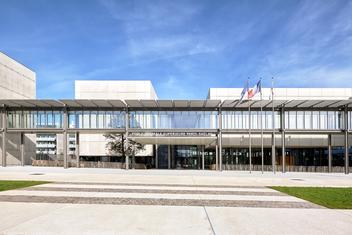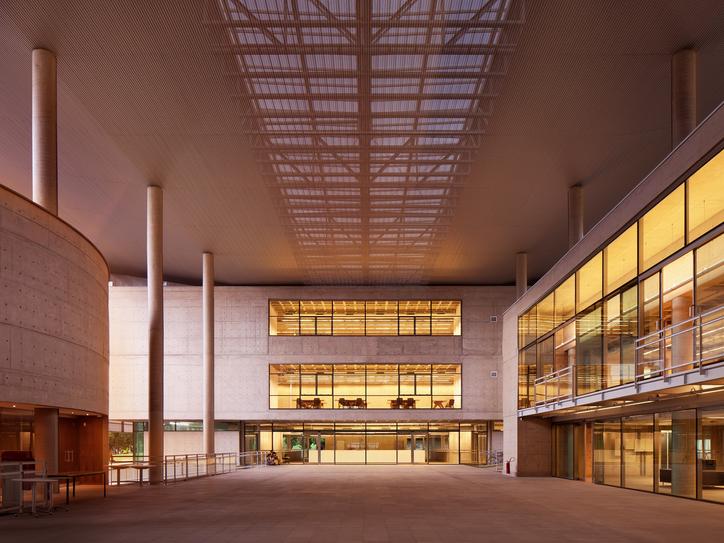
New Focus on Brazil
During the FAUBAI Fair held from 15 to 19 April in Belo Horizonte, Campus France will release a new Focus on Brazil. This publication presents the Brazilian higher education, student mobilities schemes between Brazil and France, and existing cooperation agreements between the two countries in academic and scientific fields.
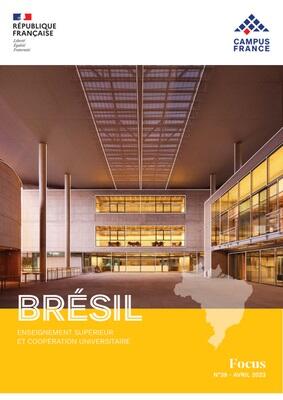
Sixième pays du monde par sa population et cinquième par l’étendue de son territoire le Brésil est aussi la et la première économie d’Amérique latine. Le taux d’alphabétisation des jeunes a progressé de 95 % en 2000 à 99 % à la fin des années 2010 et presque tous les enfants brésiliens vont à l’école primaire. Le nombre d’étudiants de l’enseignement supérieur a plus que quadruplé au cours des 25 dernières années, passant de 1,75 million en 1995 à près de 9 millions en 2020.
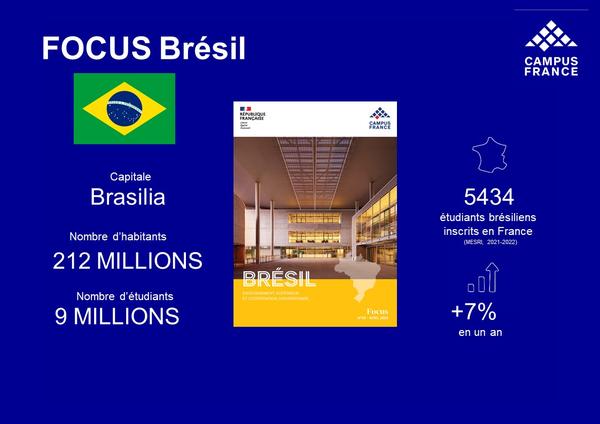
L'enseignement supérieur au Brésil
L’enseignement supérieur accueille près de 9 millions d’étudiants dans 2 448 institutions.
-
Il est structuré en deux niveaux : graduação, équivalent de notre 1er cycle universitaire soit 4 ou 5 années d’études débouchant sur un diplôme de licenciatura qui permet de devenir enseignant ou enseignante, ou de bacharelado : tandis que le deuxième cycle, la pos-graduaçao se décompose en 2 années débouchant sur un mestrado, puis 4 années supplémentaires au moins pour l’obtention d’un doctorat.
-
77 % dans étudiants sont inscrits dans des établissements privés. Sur 2 574 établissements recensés en 2021, 2 261 (88 %) sont privés pour seulement 313 publics. Sur l’ensemble des établissements on recense au total 204 universités, dont une majorité (55 %) est publique. La plupart des institutions privées fait de la formation mais pas de recherche, ce qui explique qu’on retrouve davantage de structures publiques parmi les universités. Les établissements publics dépendent pour 43 % des États fédérés, pour 38 % du niveau fédéral et pour 19 % du niveau municipal.
-
Entre 2008 et 2018 le réseau d’enseignement supérieur privé brésilien a connu une croissance de 59 % contre 8 % pour le public. Le niveau des formations dispensées dans les établissements privés est très variable. Le nombre d’étudiants sur la période a globalement augmenté de 47 %.
- Selon Times Higher Education (THE), journal mensuel britannique spécialisé dans le domaine des études supérieures, le Brésil reste le pays d’Amérique latine qui offre la meilleure éducation dans l’enseignement supérieur. Parmi les 150 universités classées, 52 sont brésiliennes. En plus de l’Unicamp (3e au classement) et de l’USP (2e), 4 autres universités brésiliennes figurent dans le top 10 : la PUC de Rio (4e), l’université fédérale de São Paulo (Unifesp), l’université fédérale de Minas Gerais (UFMG) ainsi que l’université d’état de São Paulo (Unesp).
L’internationalisation de l’enseignement supérieur brésilien
La politique nationale d’attractivité à l’attention des étudiants internationaux consiste principalement en des mesures pour les mobilités entrantes d’étudiants des pays lusophones d’Afrique et des pays voisins d’Amérique Latine. Au cours des cinq dernières années, la réduction de moitié des crédits alloués à l’enseignement supérieur et à la recherche n’a pas facilité l’internationalisation de l’enseignement supérieur brésilien.
La question de l’attractivité de son système d’enseignement supérieur et de recherche a très longtemps été négligée par le Brésil, qui se concevait davantage comme un pays devant envoyer ses étudiants et enseignants-chercheurs se former à l’étranger, notamment en France et depuis les années 2000, dans les pays anglophones. Cela se répercute dans les statistiques de mobilité étudiante, le Brésil ne recense que 22 000 étudiants internationaux accueillis alors qu’il en envoie près de 90 000 étudiants en mobilité en 2020.
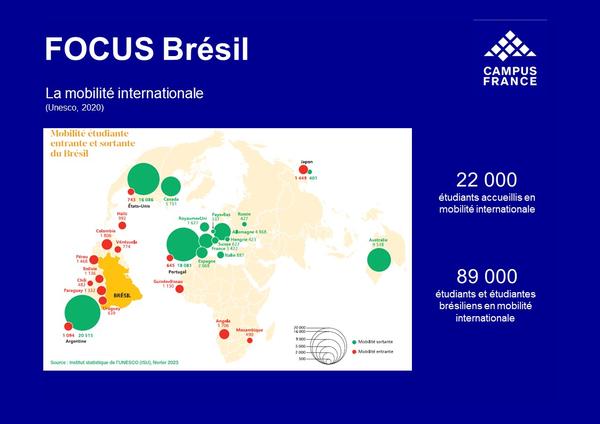
La mobilité des étudiants brésiliens a connu une forte croissance entre 2015 et 2020 (+77 %), bien plus rapide que la croissance mondiale (+32 %). Les étudiants brésiliens en mobilité s’orientent très largement vers 3 destinations : l’Argentine (23 %), le Portugal (20 %) et les États-Unis (18 %).
Deux destinations émergentes connaissent une forte croissance du nombre d’étudiants brésiliens accueillis : l’Australie (+597 % entre 2015 et 2020) et le Canada (+197 %). La France est la 3e destination européenne – derrière le Portugal et l’Allemagne – et la 7e au niveau mondial. Les effets de la pandémie de Covid-19 sur les mobilités n’apparaissent pas encore dans ces statistiques mais risquent de réduire temporairement la mobilité brésilienne.
L’alternance politique au 1er janvier 2023 a remis l’éducation et la culture au rang des priorités des politiques publiques. Les moyens des universités, les bourses d’étude et de recherche ont été notablement revalorisées et les moyens fédéraux alloués à la recherche (le fonds national recherche notamment), ont été augmentés.
La Faubai
La Faubai est l’association brésilienne d’éducation internationale. Elle a été créée en 1988 et rassemble les gestionnaires et responsables des relations internationales de plus de 200 établissements d’enseignement supérieur brésilien. Elle promeut l’intégration et la formation des gestionnaires et organise des séminaires, des ateliers, des réunions régionales, nationales et internationales ainsi qu’une conférence annuelle.
Elle encourage la coopération avec les différents types d’établissements d’enseignement supérieur brésiliens, dans le pays et à l’étranger, en collaboration avec des établissements d’enseignement supérieur, des agences, des représentations diplomatiques, des organismes et des programmes internationaux. Le salon de la FAUBAI se tiendra du 15 au 19 avril 2023 à Belo Horizonte.
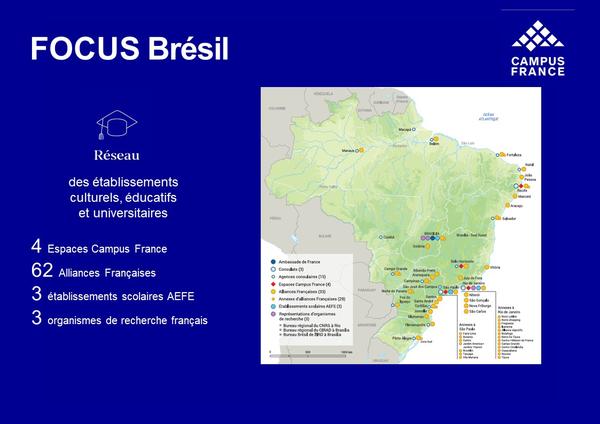
La coopération universitaire et scientifique franco-brésilienne
La coopération universitaire franco-brésilienne est riche de 1 359 accords interuniversitaires actifs dont 276 portent sur des doubles-diplômes. Les établissements d’enseignement supérieur brésiliens qu’ils soient publics ou privés, sont autonomes pour signer des accords et établir des régimes de cotutelle et des double-diplômes. Les Programmes bilatéraux de formation BRAFITEC & BRAFAGRI sont des formations croisées d’élèves-ingénieurs (BRAFITEC) et d’agronomes et vétérinaires (BRAFAGRI), basées sur des projets conçus dans la durée entre partenaires de l’enseignement supérieur français et brésiliens et qui favorisent les échanges croisés d’étudiants et d’enseignants.
Pour les années 2021 et 2022, les Brésiliens constituent la 6e nationalité dont Campus France a géré le plus de bourses avec 486 boursiers et 262 chercheurs accueillis qui ont fréquenté au total 230 établissements français. La durée moyenne de leur séjour est de six mois.
Fin 2017, la CAPES a lancé son programme institutionnel d’internationalisation PrInt, doté d’un fonds de 300 millions de reais. En août 2018, 36 établissements ont été sélectionnés sur des critères d’excellence et ont reçu des subventions pour mettre en œuvre leurs projets respectifs. Une écrasante majorité a fait figurer la France parmi ses principaux partenaires : ils constituent donc des établissements à privilégier dans la mise en place de divers dispositifs (lecteurs, chaires, doubles diplômes, écoles d’été et doctorats, structures conjointes de recherche, etc.)
Le programme CAPES-COFECUB entre le Brésil et la France, développé durant les 40 dernières années, a contribué avec succès aux échanges académiques, à la production scientifique et à la formation de jeunes chercheurs. Il est financé pour la partie française par le ministère de l’Europe et des Affaires étrangères (MEAE) et le ministère de l’Enseignement supérieur et de la Recherche (MESR) et piloté par le Comité français d’Évaluation de la Coopération universitaire et scientifique avec le Brésil (COFECUB). Pour la partie brésilienne, il est financé et administré par la CAPES. L’objectif du programme est d’amorcer ou de développer la coopération scientifique et les relations entre les centres de recherche et les universités des deux pays, à travers le soutien à des projets communs de recherche d’excellence, impliquant la mobilité de chercheurs, en accordant une priorité à la formation au niveau doctoral et post-doctoral. Il y a 87 projets en cours en 2023.
Le réseau France Alumni Brésil
Le réseau France Alumni permet de prolonger l’expérience entre la France et les étudiants brésiliens. Au Brésil, il a été lancé en 2015 et compte aujourd’hui 12 500 membres sur la plateforme. Véritables ambassadeurs des études en France, les alumni jouent un rôle essentiel dans la promotion du système universitaire français et facilitent la coopération franco-brésilienne.
Related contents
Recommended News

